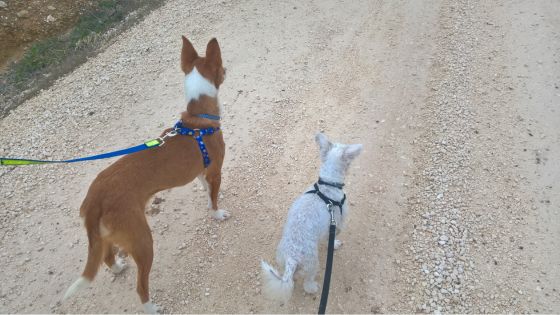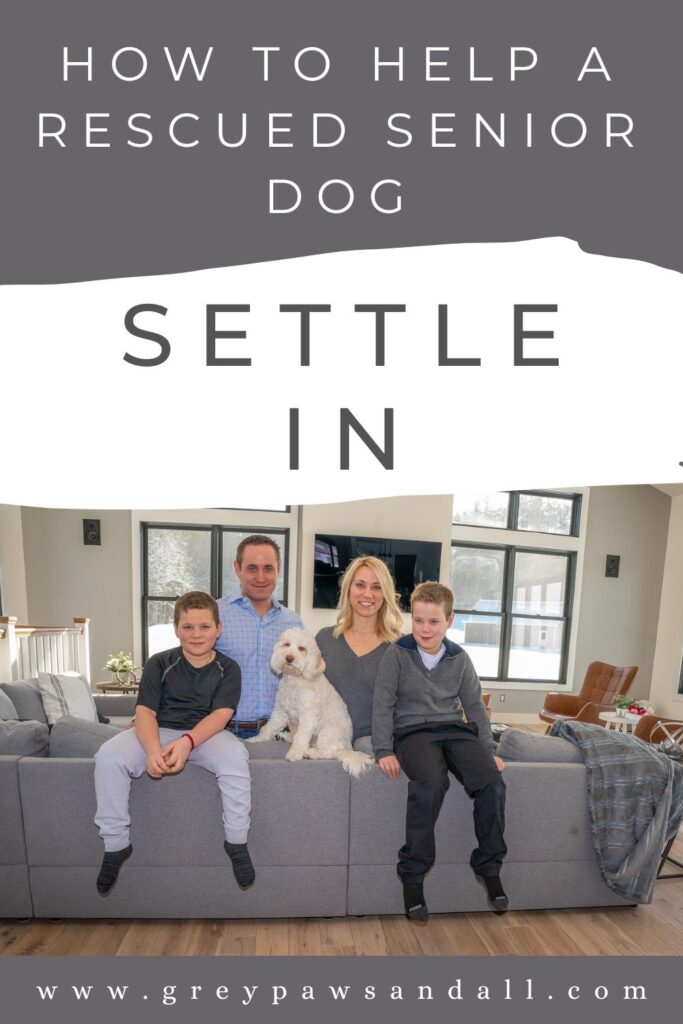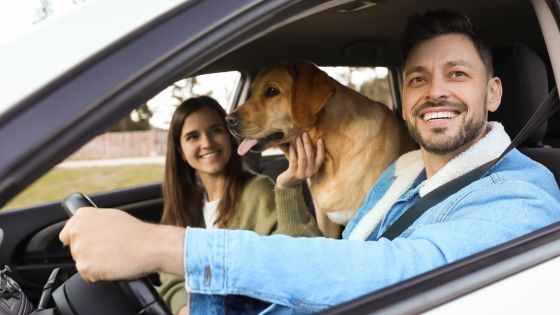Nothing makes me happier than hearing someone is bringing home a senior dog! How great must you feel, knowing you are giving a homeless animal a kind and loving home in the last months or years of life.
While adopting a senior dog is a rewarding experience, not to mention good for the soul, it can come with unique challenges.
Whether you’ve rescued a senior pup from a shelter or welcomed one from a previous owner, the first few weeks are crucial for helping them adjust. Here’s what you can expect in the first weeks with a senior dog, and how to ensure a smooth transition.
Adjustment Period: Helping a Senior Dog Settle In
Some dogs settle in very quickly while others can take days, weeks or even months. A lot has to do with their background and experiences. I’ve adopted old dogs that settled in right away, and an 8 year old puppy mill rescue named Saffy who didn’t let me pet her for 7 months. You can read her story here.
Establish a consistent routine for feeding, potty breaks, and bedtime to help them feel secure. I speak from experience when I say how important this is, and it’s what I do every time I welcome a new senior rescue into my home.
The most important thing is not to put a time limit of how long you think it should take. Be patient and things will fall into place.
Vet Check-Up: Assess Their Health
Even if your new rescue saw a vet before being adopted out, I still recommend bringing him to yours for a full check up. It will help you understand their current health status, identify any potential medical concerns, and adjust their diet or medication accordingly.
If you don’t have a vet or you’ve been considering making a switch, this article will help.

Comfort and Safety: Making a Senior Dog Comfortable
Older dogs may have mobility issues or joint pain, so ensure their new home is comfortable. Provide soft bedding, non-slip rugs, and easy access to food, water, and outdoor areas. If stairs are a challenge, consider pet ramps or rearrange furniture to limit the need for climbing.
That’s my dog Jack in the picture, hanging out on the couch.
This post will give you lots of tips and advice for making your home more comfortable for a senior dog.
Nutrition and Hydration: Watch Their Diet
Senior dogs often have specific dietary needs, and I don’t believe in a “one size fits all” approach to nutrition. If you’re unsure about their dietary needs, consult your vet to determine the best food for their health condition.
Alternatively, a holistic vet or canine nutritionist can create a diet tailored to your dog’s needs. I had a holistic vet formulate a recipe based on my dog Red’s blood tests and health issues, and I felt confident she was getting everything she needed. It was also super easy to batch cook and freeze.
It’s also very important your dog stays hydrated, so always have clean fresh drinking water easily accessible.
Bonding and Trust: Take It Slow
Building trust takes time, especially if your senior dog has been through significant changes. Use positive reinforcement, gentle petting, and a calm voice to reassure them. Allow them to come to you when they feel comfortable rather than overwhelming them with too much attention.
Read this ⇒ Golden Hearts: How to Bond With Your Senior Dog From Day One

Exercise and Mental Stimulation: Keep Them Engaged
While not every senior dog will have the same energy levels as a younger one, they still need daily walks and mental stimulation. Short, gentle walks and puzzle toys can help keep them active without causing strain.
This article will give you some great tips on keeping your dog physically active, and this one will help you with mental stimulation.
Monitoring Behavior: Look for Signs of Stress
Watch for signs of stress such as pacing, excessive panting, loss of appetite, or hiding. These could indicate anxiety or underlying health issues. Give them time to adjust, but if symptoms persist, consult a vet.
Socialization: Introduce New People and Pets Gradually
If you have other pets or family members, introduce them slowly. Keep initial interactions brief and supervised to prevent overwhelm. Allow your senior dog to set the pace for socializing.
Establish a Routine: Consistency is Key
Senior dogs thrive on routine. Feed them at the same times each day, take them on familiar walking routes, and keep their sleeping area in a consistent location. Predictability helps them feel secure in their new home.
Note: Don’t panic if this morning he ate breakfast at 7:00 and yesterday it was 7:15. Times don’t have to be exact to the second, but roughly the same time is ideal.

Enjoy the Journey: Cherish the Moments
Senior dogs have so much love to give, and every moment with them is special. Enjoy the companionship and the unique bond that comes with adopting an older dog. With patience and care, your new furry friend will soon feel right at home.
Have you recently adopted a senior dog? Did he or she settle in quickly or did it take time? If you have any tips or advice that can help other new senior dog parents, please share in the comments below!
Resources
15 Mistakes New Senior Dog Owners Make and How to Avoid Them
Must Have Items for Your Senior Dog
Aging Pet Support
“I’m a dedicated senior dog care consultant, here to help first-time senior dog parents navigate this special stage of their pup’s life with confidence and love. From health tips to daily care advice, I provide the guidance and support you need to ensure your aging dog stays happy, comfortable, and cherished every step of the way! 🐶❤️”
Click this link to book a FREE 20 minute discovery call
I’ve been rescuing and caring for senior dogs since 2009. From vision and hearing loss to obesity, dementia, kidney disease, liver issues, cardiac problems, Cushing’s, mobility challenges and more, you could say I’ve dealt with and learned a lot! In addition to my hands on experience, I’ve taken many courses and earned several qualifications to keep learning how to help senior dogs and they include: Senior Dog Enrichment, Understanding Canine Anxiety, Care of the Senior Pet and I’m a Certified Pet Loss Specialist.

